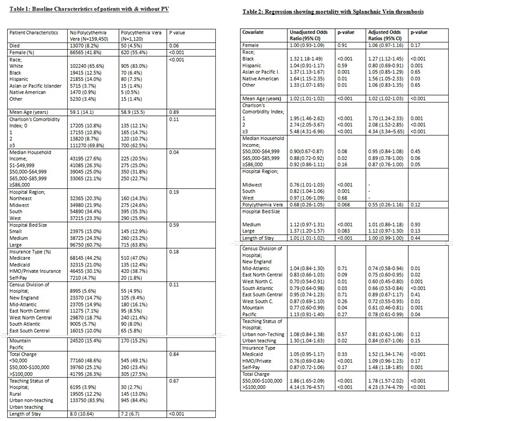Background: Thrombosis means the presence of a blood clot in a blood vessel. While thrombosis is a relatively common condition in deep veins of the limbs and the lungs, its incidence in splanchnic veins is at least 25 times lower compared to the former. Splanchnic Vein Thrombosis (SVT) involves portal, hepatic, splenic or mesenteric veins. Polycythemia Vera (PV) is one of the significant myeloproliferative neoplasms (MPN) that cause SVT.
Objectives: This study examines the relationship between PV and SVT and its impact on hospital outcomes, explicitly focusing on mortality rates in affected patients.
Methods: This retrospective cohort study uses the 2018 to 2020 National Inpatient Sample (NIS) database. Our inclusion criteria were for patients 18 years or older with Splanchnic Vein thrombosis and Polycythemia Vera diagnosis during hospitalization. We defined splanchnic vein thrombosis as patients with portal and hepatic vein thrombosis. We examined these patients' demographics and their relationship with hospital outcomes, such as length of hospital stay, cost of hospitalization and mortality. Using univariate and multivariate logistics regression models, we measured mortality as the primary outcome.
Result: We identified 160,570 patients with SVT, among whom 1,120 (0.69%) had PV. PV patients were primarily female and white, with a mean age of 58.9. The PV cohort exhibited a lower mortality rate of 4.5% compared to the SVT from other etiology. Being black, increasing age, and increasing comorbidity indices were associated with increasing mortality. Though not statistically significant, there was a trend of decreasing mortality in both unadjusted and adjusted models for PV [0.68, 95% CI (0.26-1.05)] and [0.55, 95% CI (0.26-1.16)], likely underpowered by the rarity of diagnosis.
Conclusion: Our study shows that the mortality of SVT from PV was 45% lower compared to other causes of SVT. PV did not pose an increased mortality risk compared to other etiologies, and it was not statistically significant. There is a need for further studies to understand better and ultimately help in management guidelines for SVT in PV compared to SVT due to other causes.
Disclosures
No relevant conflicts of interest to declare.


This feature is available to Subscribers Only
Sign In or Create an Account Close Modal